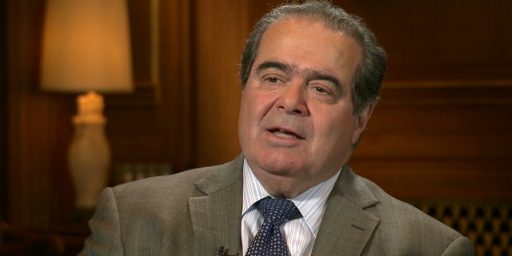Man Faces Deportation for 1997 Drug Misdemeanor
CNN is focusing on a clever remark made Tuesday by Justice Antonin Scalia and burying a much more interesting lede.
Justice Antonin Scalia opened the Supreme Court’s new term Tuesday by questioning whether a man deported to Mexico after a drug conviction would be “abstaining from tequila” for fear of violating his U.S. parole terms.
The remark came as justices heard an immigration case involving a Texas man, Reymundo Toledo-Flores, who was deported in April after being convicted of illegally entering the United States. At the time, Toledo-Flores was under supervised release, a form of parole, for a 2002 cocaine possession conviction. He served seven months in a Texas prison on that charge and was deported after serving his time.
Attorney Timothy Crooks argued to the justices that his client’s supervised-release terms left him under U.S. jurisdiction even while on Mexican soil, technically leaving him vulnerable to deportation back to the United States if he violated his parole.
Scalia responded with incredulity. “No one thinks your client is abstaining from tequila for fear of being deported,” he said. Supervision “is impossible once he leaves the country,” he added. “This is an ingenious exercise of the conceivable.”
As the story goes on to note, pretty much everyone in the courtroom thought Crooks’ argument was absurd. It was an excuse, however, for CNN to dredge up other controversies, real and contrived, involving Scalia.
The angle that I find interesting, however, was buried fourteen paragraphs into the story:
Tuesday’s arguments came in appeals by Toledo-Flores and another man, Jose Lopez, who is facing deportation after a 1997 conviction for aiding and abetting the possession of cocaine in South Dakota. Their cases highlight a conflict between state and federal laws over the seriousness of drug crimes involving immigrants.
Lopez entered the United States illegally in 1985 and later gained permanent residency. He and his wife, a legal resident, have two children, both U.S. citizens. He was ordered deported in 1998, but that order was stayed pending the high court’s ruling. Under federal law, the charges against both men are misdemeanors. But the federal Board of Immigration Appeals concluded they committed “aggravated felonies” and were eligible for deportation.
[…]
Deputy Solicitor General Edwin Kneedler countered that the court should look to various state laws, where the majority of criminal cases are prosecuted, not some “supposed” uniform standard of federal statutes. Souter called the Bush administration’s position “very strange.” “The problem is that state law and federal law are at odds over the gravity of the offense,” he said.
And, surely, federal law should control for immigration issues since, by definition, one immigrates to a country, not a locality.
Granted that this case has dragged on for a ridiculous amount of time owing to the vagaries of the appelate system and that the story doesn’t tell us whether Lopez’ children were fathered before or after the conviction, the idea that a legalized resident would be deported for the commission of a misdemeanor, thereby placing inordinate hardship on his two American citizen children, is unconscionable. Thankfully, it sounds as if the Justices think that, too.






the idea that a legalized resident would be deported for the commission of a misdemeanor, thereby placing inordinate hardship on his two American citizen children, is unconscionable. Thankfully, it sounds as if the Justices think that, too.
Sounds like some of them do. But not Scalia. As far as Scalia’s remarks go, his defenders might say he is simply colorful, his detractors would say inappropriate.
The great news is he has a lifetime
contractappointmenton the Las Vegas stripto the bench so we can hear hiscomic stylingswisdom on jurisprudence for a while longer.